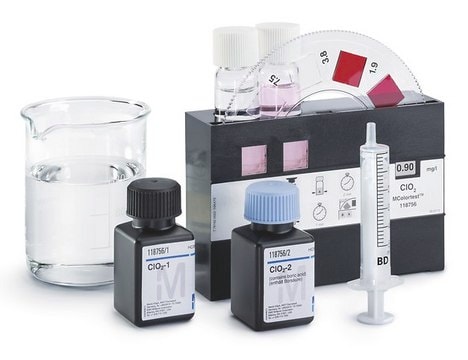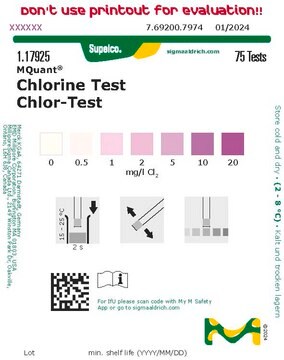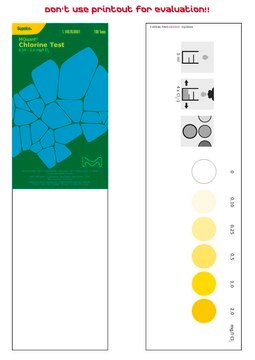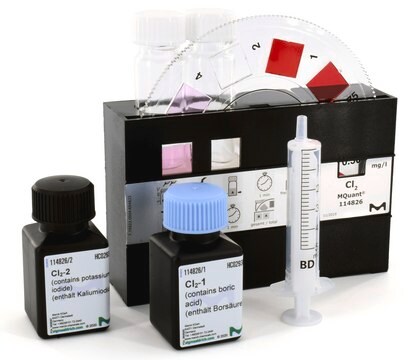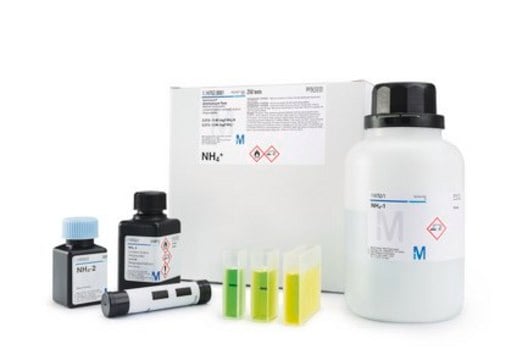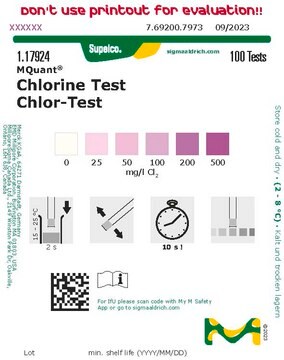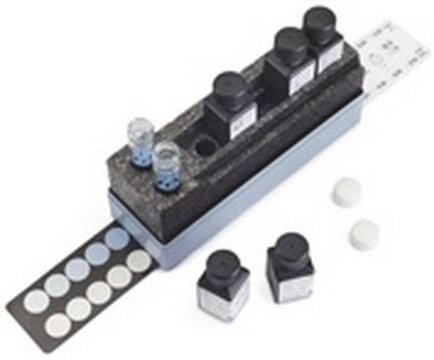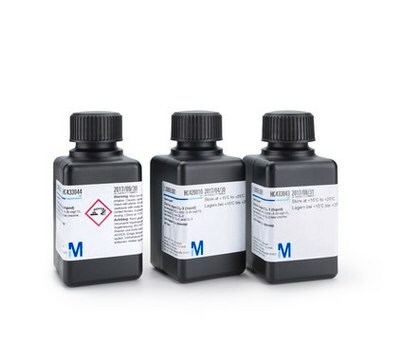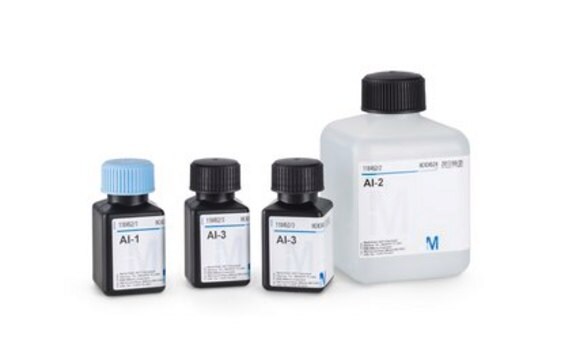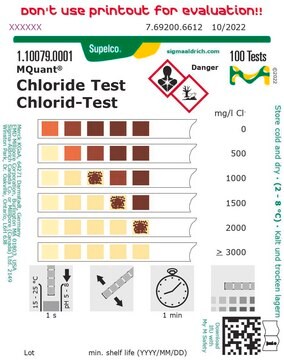1.14976
Chlorine Test Kit, colorimetric
0.25-15 mg/L (Cl₂), MQuant®
Synonym(s):
Chlorine Visual Test Kit
About This Item
Recommended Products
Product Name
Chlorine Test, colorimetric, 0.25-15 mg/L (Cl2), for use with MCOLORTEST®
product line
MColortest®
Quality Level
specific analyte(s)
chlorine
measuring range
0.25-15 mg/L (Cl2)
compatibility
for use with MCOLORTEST®
detection method
colorimetric
storage temp.
15-25°C
General description
- Groundwater and surface water
- Drinking water and mineral water
- Waters from aquaculture
- Wastewater
- Electroplating wastewater
- Disinfectant solutions
This test is not suited for seawater.
Method
In weakly acidic solution free chlorine reacts with dipropyl-p-phenylenediamine (DPD) to form a red-violet dye. In the presence of potassium iodide, also combined chlorine is measured in this reaction. The chlorine concentration is measured semiquantitatively by visual comparison of the color of the measurement solution with the color fields of a color disk. The test evaluates the color reaction based on the transmitted light method. So even turbid and colored water samples can be analyzed without further preparation.
The color disk is made of very durable, lightfast plastic, thus suitable for industrial areas and wet environments.
Using the refill pack 1.14977 the original test kit can be used for a very long time, making it a particularly economical and ecological system.
Application
- 3,3′,5,5′-tetramethylbenzidine as a multi-colorimetric indicator of chlorine in water in line with health guideline values: This study focuses on using 3,3′,5,5′-tetramethylbenzidine as an indicator for the presence of chlorine in water, providing a method to ensure compliance with health guidelines through a visual and straightforward test (Palladino et al., 2020).
- Analysis of free chlorine in aqueous solution at very low concentration with lateral flow tests: This paper introduces a method for testing free chlorine concentrations in water at very low levels using lateral flow assays, which are crucial for monitoring water quality and ensuring safety standards (Schwenke et al., 2019).
- Some factors influencing the stability of Sterilox, a super-oxidised water: This article, while focused on the stability of Sterilox as a disinfectant, deals with the broader context of using chlorine solutions in settings requiring stringent sanitation measures, highlighting the importance of regular chlorine testing to ensure efficacy (Rossi-Fedele et al., 2011).
Legal Information
Signal Word
Danger
Hazard Statements
Precautionary Statements
Hazard Classifications
Eye Irrit. 2 - Repr. 1B
Storage Class Code
6.1D - Non-combustible, acute toxic Cat.3 / toxic hazardous materials or hazardous materials causing chronic effects
WGK
WGK 2
Flash Point(F)
Not applicable
Flash Point(C)
Not applicable
Certificates of Analysis (COA)
Search for Certificates of Analysis (COA) by entering the products Lot/Batch Number. Lot and Batch Numbers can be found on a product’s label following the words ‘Lot’ or ‘Batch’.
Already Own This Product?
Find documentation for the products that you have recently purchased in the Document Library.
Customers Also Viewed
Protocols
AQA Standard for free chlorine - Preparation of a standard solution for free chlorine - Preparation of a stock solution of free chlorine: First prepare a 1:10 dilution using a sodium hypochlorite solution containing approximately 6 - 14 % of active chlorine. For this pipette 10 ml of sodium hypochlorite solution into a calibrated or conformity-checked 100-ml volumetric flask and then make up to the mark with water for analysis.
Preparation of a standard solution for free Chlorine according to DIN EN ISO 7393
Related Content
AQA Standard for free chlorine - Preparation of a standard solution for free chlorine
Our team of scientists has experience in all areas of research including Life Science, Material Science, Chemical Synthesis, Chromatography, Analytical and many others.
Contact Technical Service